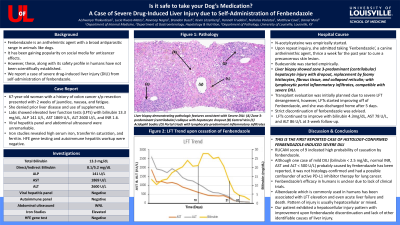Sunday Poster Session
Category: Liver
P1129 - Is It Safe to Take Your Dog’s Medication? A Case of Severe Drug-Induced Liver Injury Due to Self-Administration of Fenbendazole
Sunday, October 22, 2023
3:30 PM - 7:00 PM PT
Location: Exhibit Hall

Has Audio

Aishwarya Thakurdesai, MBBS, MD
University of Louisville School of Medicine
Louisville, KY
Presenting Author(s)
Aishwarya Thakurdesai, MBBS, MD, Lucia Rivera-Matos, MD, Navroop Nagra, MD, Brandon Busch, MD, Kevin Litzenberg, MD, Hannah Frudden, MD, Nicholas Pavlatos, MD, Daniel D. Mais, MD, Matthew C. Cave, MD
University of Louisville School of Medicine, Louisville, KY
Introduction: Fenbendazole is an anthelmintic agent with a broad antiparasitic range in animals like dogs. It has been gaining popularity on social media for anticancer effects; however, these, along with its safety profile in humans have not been scientifically established. We report a case of severe drug-induced liver injury (DILI) from self-administration of fenbendazole.
Case Description/Methods: 67-year-old woman with a history of colon cancer status post resection presented with 2 weeks of jaundice, nausea, and fatigue. She denied prior liver disease and initially denied use of supplements. Labs showed elevated liver function tests (LFTs) with bilirubin 13.3 mg/dL, ALP 141 U/L, AST 1869 U/L, ALT 2600 U/L, and INR 1.6. Viral hepatitis panel and abdominal ultrasound were unremarkable. Iron studies revealed high serum iron, transferrin saturation, and ferritin. HFE gene testing and autoimmune hepatitis workup were negative. N-acetylcysteine was empirically started. Upon repeat inquiry, she admitted to using ‘Fenbendazole’, a canine anthelminthic agent, thrice a week for the past year to cure a precancerous skin lesion. A liver biopsy was performed, and budesonide was started. Biopsy showed zone 3-predominant (centrilobular) hepatocyte injury with dropout, replacement by foamy histiocytes, fibrous tissue, and collapsed reticulin; with lymphocytic portal inflammatory infiltrates, compatible with severe DILI. Since her LFTs started improving and she had no encephalopathy, she was discharged home after 5 days. Strict discontinuation of fenbendazole was advised. LFTs continued to improve with bilirubin 4.3 mg/dL, AST 78 U/L, and ALT 86 U/L at 3-week follow-up.
Discussion: This is the first reported case of histology-confirmed fenbendazole-induced severe DILI. A score of 9 on the RUCAM scale indicated high probability of DILI causation by fenbendazole. Although one case of mild DILI (bilirubin < 2.5 mg/dL, normal INR, AST and ALT < 500 U/L) probably caused by fenbendazole has been reported, it was not histology confirmed and had a possible confounder of active PD-L1 inhibitor therapy for lung cancer. Fenbendazole’s efficacy in humans is unclear due to lack of clinical trials. Albendazole which is commonly used in humans has been associated with LFT elevation and even acute liver failure and death. The pattern of injury is usually hepatocellular or mixed. Our patient exhibited a hepatocellular injury pattern with improvement upon fenbendazole discontinuation and lack of other identifiable causes of liver injury.

Disclosures:
Aishwarya Thakurdesai, MBBS, MD, Lucia Rivera-Matos, MD, Navroop Nagra, MD, Brandon Busch, MD, Kevin Litzenberg, MD, Hannah Frudden, MD, Nicholas Pavlatos, MD, Daniel D. Mais, MD, Matthew C. Cave, MD. P1129 - Is It Safe to Take Your Dog’s Medication? A Case of Severe Drug-Induced Liver Injury Due to Self-Administration of Fenbendazole, ACG 2023 Annual Scientific Meeting Abstracts. Vancouver, BC, Canada: American College of Gastroenterology.
University of Louisville School of Medicine, Louisville, KY
Introduction: Fenbendazole is an anthelmintic agent with a broad antiparasitic range in animals like dogs. It has been gaining popularity on social media for anticancer effects; however, these, along with its safety profile in humans have not been scientifically established. We report a case of severe drug-induced liver injury (DILI) from self-administration of fenbendazole.
Case Description/Methods: 67-year-old woman with a history of colon cancer status post resection presented with 2 weeks of jaundice, nausea, and fatigue. She denied prior liver disease and initially denied use of supplements. Labs showed elevated liver function tests (LFTs) with bilirubin 13.3 mg/dL, ALP 141 U/L, AST 1869 U/L, ALT 2600 U/L, and INR 1.6. Viral hepatitis panel and abdominal ultrasound were unremarkable. Iron studies revealed high serum iron, transferrin saturation, and ferritin. HFE gene testing and autoimmune hepatitis workup were negative. N-acetylcysteine was empirically started. Upon repeat inquiry, she admitted to using ‘Fenbendazole’, a canine anthelminthic agent, thrice a week for the past year to cure a precancerous skin lesion. A liver biopsy was performed, and budesonide was started. Biopsy showed zone 3-predominant (centrilobular) hepatocyte injury with dropout, replacement by foamy histiocytes, fibrous tissue, and collapsed reticulin; with lymphocytic portal inflammatory infiltrates, compatible with severe DILI. Since her LFTs started improving and she had no encephalopathy, she was discharged home after 5 days. Strict discontinuation of fenbendazole was advised. LFTs continued to improve with bilirubin 4.3 mg/dL, AST 78 U/L, and ALT 86 U/L at 3-week follow-up.
Discussion: This is the first reported case of histology-confirmed fenbendazole-induced severe DILI. A score of 9 on the RUCAM scale indicated high probability of DILI causation by fenbendazole. Although one case of mild DILI (bilirubin < 2.5 mg/dL, normal INR, AST and ALT < 500 U/L) probably caused by fenbendazole has been reported, it was not histology confirmed and had a possible confounder of active PD-L1 inhibitor therapy for lung cancer. Fenbendazole’s efficacy in humans is unclear due to lack of clinical trials. Albendazole which is commonly used in humans has been associated with LFT elevation and even acute liver failure and death. The pattern of injury is usually hepatocellular or mixed. Our patient exhibited a hepatocellular injury pattern with improvement upon fenbendazole discontinuation and lack of other identifiable causes of liver injury.

Figure: Liver biopsy demonstrating pathologic features consistent with Severe Drug-Induced Liver Injury
(A) Zone 3-predominant (centrilobular) collapse with hepatocyte dropout
(B) Central Vein
(C) Acidophil bodies
(D) Portal triads with lymphocyte-predominant inflammatory infiltrates
(A) Zone 3-predominant (centrilobular) collapse with hepatocyte dropout
(B) Central Vein
(C) Acidophil bodies
(D) Portal triads with lymphocyte-predominant inflammatory infiltrates
Disclosures:
Aishwarya Thakurdesai indicated no relevant financial relationships.
Lucia Rivera-Matos indicated no relevant financial relationships.
Navroop Nagra indicated no relevant financial relationships.
Brandon Busch indicated no relevant financial relationships.
Kevin Litzenberg indicated no relevant financial relationships.
Hannah Frudden indicated no relevant financial relationships.
Nicholas Pavlatos indicated no relevant financial relationships.
Daniel Mais indicated no relevant financial relationships.
Matthew Cave indicated no relevant financial relationships.
Aishwarya Thakurdesai, MBBS, MD, Lucia Rivera-Matos, MD, Navroop Nagra, MD, Brandon Busch, MD, Kevin Litzenberg, MD, Hannah Frudden, MD, Nicholas Pavlatos, MD, Daniel D. Mais, MD, Matthew C. Cave, MD. P1129 - Is It Safe to Take Your Dog’s Medication? A Case of Severe Drug-Induced Liver Injury Due to Self-Administration of Fenbendazole, ACG 2023 Annual Scientific Meeting Abstracts. Vancouver, BC, Canada: American College of Gastroenterology.
